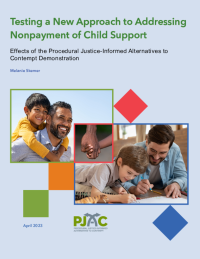Testing a New Approach to Addressing Nonpayment of Child Support
Effects of the Procedural Justice-Informed Alternatives to Contempt Demonstration

When a child does not live with both parents, the parent with whom the child does not live is known as the “noncustodial parent.” The noncustodial parent may be responsible for a share of the costs associated with raising the child. Parents who do not make their child support payments can be subject to enforcement measures such as license suspensions or interceptions of tax refunds. If these measures do not yield sufficient payment, child support programs can refer parents to the legal system for civil contempt of court. Civil contempt proceedings require noncustodial parents to attend hearings and may lead to arrest or jailing.
In recent years, some child support policymakers and researchers have questioned the fairness and effectiveness of pursuing civil contempt to secure child support payments, particularly for parents with low incomes. Civil contempt proceedings are costly, burdensome, and often counterproductive to the goals of the child support program. They can impede employment, increase child support debt, alienate noncustodial parents from their children, and decrease parents’ future cooperation.
The Procedural Justice-Informed Alternatives to Contempt (PJAC) demonstration tested a different approach to improving child support payments. Developed by the Office of Child Support Enforcement, it integrated principles of procedural justice (the idea of fairness in processes) into enforcement practices in six child support agencies across the United States as an alternative to standard contempt proceedings. PJAC services aimed to address noncustodial parents’ reasons for nonpayment, promote their positive engagement with the child support program and the other parent, and improve the consistency and completeness of their payments, all while avoiding a court-led civil contempt process.
The PJAC demonstration used a random assignment research design. Parents who had reached the point of a contempt referral were assigned either to a PJAC services group, which had access to child support services informed by procedural justice, delivered by a specially trained PJAC case manager, or to a business-as-usual group, which proceeded to the standard contempt process. This report compares the outcomes of parents in these two groups. Findings include:
- The PJAC intervention did not meet its primary goals of improving payment compliance and regularity. It generated a small but statistically significant reduction in payment compliance and had no effect on payment regularity.
- PJAC successfully reduced reliance on civil contempt filings, both in the year after study enrollment and over a longer time frame of 30 months. Notably, however, this effect is a feature of the demonstration design, in that parents assigned to the PJAC services group were diverted from contempt and, for the most part, were only referred to the contempt process if they were not responsive to their PJAC case managers.
All parents in the study were assessed as having an ability to pay. Nevertheless, both parents and child support staff members reported that, in actuality, many struggled with obtaining and maintaining consistent employment that paid enough for them both to meet their own basic needs and to make child support payments in the amount they were ordered. Noncustodial parents’ difficulty meeting their child support obligations point to some of the limitations of the PJAC model: limited earnings may make it difficult for many parents to comply with their orders regardless of whether they perceive the process to be fair. However, it is noteworthy that only small decreases in payment outcomes accompanied PJAC’s large reduction in civil contempt filings, suggesting that PJAC may still be a better option overall. A future report will compare the costs and benefits of PJAC services with those of business-as-usual child support enforcement.






